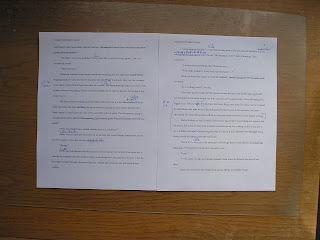I store pretty much everything I cut on flash drives or external hard drives: a line of dialogue or description, scenes I cut from novels or short stories, an interesting character, projects I abandoned, and even stories rejected so often I ran out of places to send them. I cannibalize enough to make it worthwhile.
I published Blood on the Tracks, the first Woody Guthrie novel, in 2013, but I wrote the first version of that story late in 2003. In various forms, revisions, and under at least four titles, the book(s) received over 110 rejections.
Sifting through the wreckage, I found a complete MS called The Cheater, an earlier version of what eventually saw print. Between 2006 and 2008, I pitched it to 58 agents. Interestingly, three of them asked for a full MS, another asked for 100 pages, and two others asked for 50 pages or the first three chapters. They all turned it down, usually without comment, but one with the kind of rejection that makes writers crazy: "You're a good writer and there's a lot to like here, but I can't sell this."
No further explanation.
Eleven years later, I still don't know why that MS was rejected, but I suspect that it was because I changed genre in mid-story. The premise was that the PI who would later become Woody Guthrie met Megan Traine at their high school reunion and they teamed up to solve a murder that involved one of the their classmates. Alcoholism and domestic abuse were important themes, and I suspect agents freaked when the cozy went south.
A few weeks ago, I went through the book again. I even found two pages of revision notes from 2010, when I considered revising that 78K-word story for my then-publisher, who had a 70K-word limit.
The cozy high school reunion idea is autobiographical. I met the inspiration for Megan Traine at my own reunion. Although we graduated together (Our class graduated 691 students), we never met in school, and she became a session musician in Detroit. The reunion idea was the crux of several versions of the book, but I finally decided that was the problem and abandoned it for Blood on the Tracks.
The Cheater, which I also sent out twice as Alma Murder, presented another problem. The PI was from Connecticut and his name was Erik Morley, but Megan Traine was constant through all versions of the book. Her character deepened, but changed very little between 2003 and her real debut ten years later. I figured if I put her in Detroit with a different lover, she'd look a little slutty, so I decided to change her name and background. The plot would still work, and I liked the POV of the classmate, a woman accused of killing her abusive husband. She was a lawyer and a functioning alcoholic. So much for the cozy, right?
I studied my revision notes, revised them some more, added new ideas, and rewrote about 40 pages of the book. I changed Megan Traine's name and background and cut all the music scenes from earlier versions (Erik Morley still played guitar, another constant with Woody and one of the few things he had in in common with me).
It was like sticking my hand into a garbage disposal.
The more I read, the more I realized that Meg and music generated some of the best scenes in that book. Changing her would force me to re-write or cut parts that gave all the characters more depth.
Fourteen years ago, I loved the book and the characters and we were a team. The rewriting. . . not so much. It became a chore instead of a passion. I stuck it out for about three weeks, then remembered the advice all doctors have at the top of the list.
First, do no harm.
I was mutilating something I loved and the changes would make it different, but not better. I decided to leave the book alone.
Maybe I'll publish it someday as an eBook, and UR-version of Blood on the Tracks. If I do, Alma Murder still works as a title. Or, maybe, I'll just leave it sleeping on the hard drive where it's happy.
I was surprised that a 14-year-old MS still felt like I actually knew what I was doing. Now, the biggest change would be a global edit to replace the double-space after end punctuation. And maybe to eliminate a few semi-colons. I have several short stories on that same disc that don't merit reworking. I guess this particular story was more important to me.
Samuel Johnson said that only a blockhead writes for any reason other than money. But sometimes money's not enough, either. Sometimes we do it for love.
What do you have in your closet?










































